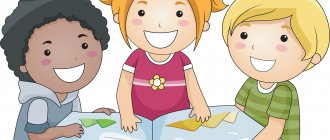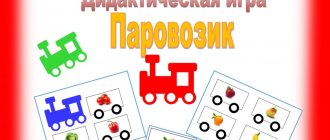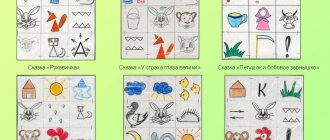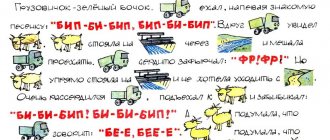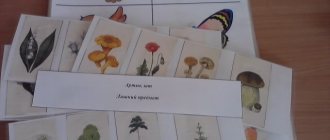“Development of children’s coherent speech through theatrical and play activities.”
2.1. Development of coherent speech in children of senior preschool age.
Speech, a wonderful gift of nature, is not given to a person from birth. It takes time for the child to start talking. And adults must make a lot of effort so that the child’s speech develops correctly and in a timely manner.
A preschool educational institution develops all children's inclinations and abilities, and among them there is nothing more significant and important in importance than the ability to speak. Therefore, systematic teaching of speech, methodical development of speech and language form the basis of the entire system of education in kindergarten. During the period of preschool childhood, significant changes occur in the thinking of children: their horizons expand, mental operations improve, new knowledge and skills appear, and therefore speech improves. [33 In the development of coherent speech, the close connection between the speech and mental development of children, the development of their thinking, perception, and observation is clearly evident. In order to talk about something well and coherently, you need to clearly imagine the object of the story (object, event), be able to analyze, select the main (for a given communication situation) properties and qualities, establish cause-and-effect, temporal and other relationships between objects and phenomena. Observing various phenomena of the surrounding life (nature, everyday life, the work of adults, etc.), great importance is given to the development of coherent speech in children. The sky, water and earth, fields and forests, thunderstorms, the sound of the wind, the colors of golden autumn, the awakening of nature in spring - all this has an emotional impact on the child and encourages him to speak out. The possibility of repeated observations creates conditions for the correct consolidation of what is perceived in speech and provides material for comparison, generalization, and description of objects and phenomena. By observing nature, a child learns to find and correctly explain the relationship between objects and their changes in accordance with time, circumstances, i.e. explain the essence of the phenomenon. He begins to use sentences involving composition and submission. The methods and techniques we select for the development of coherent speech ensure conscious, deep and lasting mastery of the native language. Therefore, we strive to ensure that children accurately convey the results of observations. [2]
The development of coherent speech in children is carried out in the process of everyday life, as well as in educational activities. The ability to coherently, consistently accurately and figuratively express one’s thoughts also influences aesthetic development. When composing his stories, the child tries to use figurative words and expressions. Some children do not pronounce correctly all the sounds of their native language, do not know how to use intonation means of expression, or regulate the speed and volume of speech depending on the situation. There are also errors in the formation of different grammatical forms (genitive plural of nouns, agreement of nouns with adjectives, different ways of word formation). And, of course, a number of children find it difficult to construct complex syntactic structures, which leads to incorrect combination of words into a sentence and disruption of the connection between sentences in a coherent statement. And therefore, the development of coherent speech is inseparable from solving other problems of speech development: enriching and activating the vocabulary, forming the grammatical structure of speech, nurturing the sound culture of speech. Thus, in the process of vocabulary work, the child accumulates the necessary vocabulary, gradually masters the ways of expressing certain content in words, and ultimately acquires the ability to express his thoughts most accurately and completely. [7; 8; 15] It is important to remember that children first move to a coherent sentence in stories of a calm, narrative nature. When conveying events that caused vivid emotional experiences, the child lingers longer on the situational-expressive presentation. Thus, when children reach senior preschool age, coherent speech reaches a fairly high level. The child answers questions with fairly accurate, brief or detailed (if necessary) answers. The ability to evaluate the statements and answers of comrades, supplement or correct them is developed. In retelling literary works (fairy tales or short stories), children learn to coherently, consistently and expressively present the finished text without the help of an adult, intonationally conveying the dialogue of the characters and the characteristics of the characters. In storytelling based on a picture, the ability to come up with a title for a story in accordance with the content is developed. When talking about toys (or a set of toys), children are taught to compose stories and fairy tales, observing the composition and expressive image of the text. When choosing appropriate characters to tell, children give their descriptions and characteristics. In the senior group, learning to tell stories from personal experience continues, and these can be statements of different types - descriptive, narrative, contaminated
The influence of theatrical activities on the development of speech in preschool children
Olga Nekhay
The influence of theatrical activities on the development of speech in preschool children
The development of speech in a preschool child is a complex process and for its successful implementation a combination of all components is necessary that affect the quality and content of speech .
One of the most effective means of developing and educating a child in preschool age is theater and theatrical games , since play is the leading activity of preschool children , and theater is one of the most accessible forms of art, which allows solving many pressing problems of pedagogy and psychology , related to artistic and moral education, the development of personal communicative qualities, the development of imagination , fantasy, initiative, etc.
of theatrical play for speech development is great (improving dialogues and monologues, mastering the expressiveness of speech ). In theatrical play, emotional development : children get acquainted with the feelings and moods of the characters, master the ways of their external expression, understand the reasons for this or that mood, the game is a means of self-expression and self-realization of the child. A new role, especially the dialogue of characters, confronts the child with the need to express himself clearly, distinctly, and intelligibly. His dialogical speech and its grammatical structure improve, he begins to actively use the dictionary, which, in turn, is also replenished.
Theatrical play stimulates active speech by activating vocabulary, improves the sound culture of speech , its grammatical structure, and articulatory apparatus. The child learns the richness of his native language and its means of expression. The role played, the lines spoken, confront the child with the need to express himself clearly, distinctly, and intelligibly. Children better assimilate the content of the work, the logic and sequence of events, their development and causality. The development of speech is closely related to the formation of the child’s imagination and thinking. Gradually, the ability to compose simple stories, but interesting in semantic load and content, to construct phrases grammatically and phonetically correctly, and to compose their content compositionally develops, contributes to the mastery of monologue speech, which is of paramount importance for the full preparation of a child for school education.
The influence of theatrical activities on the development of children's speech is undeniable . Theatrical activities are one of the most effective ways to develop speech and demonstrate their creative abilities, as well as the activity in which the principle of learning is most clearly manifested: learning by playing. With the help of theatrical activities, you can solve almost all problems of the speech development . And along with the basic methods and techniques of children’s speech development , it is possible and necessary to use the richest material of the people’s verbal creativity.
Thus, theatrical activities are an effective means of socialization of a preschooler . A child’s participation in theatrical activities creates favorable conditions for him develop In the course of improving game dialogues and monologues, mastering the expressiveness of speech the child’s speech development occurs most effectively . Theatrical activities allow you to develop the experience of social skills and behavior, solve many problematic situations indirectly on behalf of a character, which helps to overcome timidity, self-doubt and shyness
Theatrical games are an interesting , understandable and accessible activity . Therefore, even the most timid, insecure children take part in them. Theatrical and play activities enrich children with new impressions, knowledge, develop interest in literature, and also activate the vocabulary, improve coherent speech, the sound side of speech and its expressiveness.
With the help of theatrical activities, you can solve almost all the problems of the speech development and, together with the basic methods and techniques of children’s speech development , you need to use this rich material of the people’s verbal creativity.
The influence of didactic and theatrical games on the speech development of a preschooler
While acting out the plot, children recreate an imaginary situation. By performing improvised roles, they form the qualities necessary for the development of a full-fledged inner world:
- intelligence;
- imagination;
- the ability to express ideas in words;
- ability to act in the given circumstances;
- desire to communicate with peers.
Speech development through theatrical activities
One possible form of role-playing is participation in the theater. By acting out familiar stories and participating in productions, young artists not only enrich their vocabulary and improve their imagination; thanks to the role, the performer has the opportunity to experience character traits that are unusual for him.
Theater
Note! A coward can play a brave man, and a kid with a poor appetite can play Robin Bobbin Barabek. One actor needs to stop whispering and develop the ability to speak openly and confidently. Some suffer from excessive loudness and with the help of a role they learn not to shout, mastering the power of their voice.
Thematic week “Indoor plants” in the preparatory group
Performing a play broken into lines forces all the actors to watch what is happening so as not to miss their words. This teaches you to be attentive to the conversation of your interlocutor, not to interrupt, and to follow the general flow of the conversation.
Why does theatrical activity contribute to the development of speech? Theater classes greatly influence the development of a child’s articulatory apparatus. Through rehearsals, the unclearness of pronounced sounds, the slurredness of words used, and the inability to speak loudly enough are corrected.
Important! Learning roles helps to express thoughts coherently and makes children's speech more vivid and emotionally charged.
The development of speech in the older group through theatrical activities can be carried out using different types of dolls:
- standing;
- fingered;
- puppets;
- gloves
The movements of the fingers and hands themselves contribute to the improvement of fine motor skills and, as a result, the development of the speech apparatus; the child increases his ability to concentrate. The words must match the actions of the dolls.
The stage of a puppet theater is always much smaller than the space intended for the theater of living people. Therefore, young artists are very close to each other. Any thoughtless movement can destroy the scenery or interfere with the performance. In such conditions, the ability to coordinate one’s actions, be patient and attentive is developed.
puppet show
The importance of theatrical activities in the speech development of children of senior preschool age
The importance of theatrical activities in the speech development of preschool children.
Theater is a wonderful art!
It ennobles and educates a person. Anyone who truly loves theater always takes away from it a supply of wisdom and kindness!
K.S.Stanislavsky
Preschool age is a unique period of human development; it is a special world with its own language, way of thinking, and actions. This is a period of active assimilation by the child of his native language, the formation and development of all aspects of speech - phonetic, lexical, grammatical.
Unfortunately, in the modern world, live communication for children is increasingly being replaced by computers and television, and this trend is constantly growing. As a result, the number of children with unformed speech is steadily increasing. This is why speech development is becoming the most pressing problem in modern society.
Well-developed speech helps a child to easily communicate with the outside world, clearly express his thoughts and desires, consult with peers, parents, teachers, promotes the development of mental functions and successful learning at school. Full command of the native language in preschool childhood is a necessary condition for solving the problems of mental, aesthetic, moral education, for the full formation of the child’s personality.
The speech development of a child is carried out in various types of children's activities, one of which is theatrical performance .
Theatrical activity is improvisation, the animation of objects and sounds, a vivid emotional transmission of the image of the hero by verbal and non-verbal means, it is associated with musical and speech activities: singing, moving to music, listening, improvisation, musical playing. Theatrical activities stimulate active speech by expanding vocabulary, working to improve the articulation apparatus and expanding the area of communication (with toys, peers, adults), is an inexhaustible source of development of feelings, experiences, emotional discoveries of the child, introduces him to spiritual wealth, is the most important means development of the conditions necessary for organizing joint activities of children, during which the speech development of preschool children occurs. Theatrical play helps create situations in which even the most uncommunicative and constrained children enter into verbal communication and open up.
Collective theatrical activities are aimed at a holistic impact on the child’s personality, his emancipation, involvement in action, while activating all his capabilities; for independent creativity; development of all leading mental processes; promotes self-knowledge and self-expression of the individual with a fairly high degree of freedom; creates conditions for the socialization of the child, while strengthening his adaptive abilities, corrects communication deviations; helps to realize the feelings of satisfaction, joy, significance that arise as a result of identifying hidden talents.
Theatrical classes can be divided into four sections:
Rhythmoplasty - includes rhythmic, musical and plastic games for the development of children’s motor abilities. Rhythmoplasty develops in a child a sense of harmony of his body with the world around him.
Culture and speech technique – This section includes games and exercises aimed at developing breathing and the speech apparatus. Exercises to develop diction, articulation and intonation. Assignments for writing short fairy tales.
Theatrical game - This section is designed to develop in a child the ability to be creative in any activity, to be able to communicate with peers and adults in various life situations.
Fundamentals of theatrical culture - This section introduces the types of theater, the culture of behavior in the theater, and theatrical professions.
“Personal distance”, speech and non-speech components in mediated communication: facial expressions, gestures, “eye contact” are of great importance for the development of children. At the same time, modern developments in technology make it possible to use various teaching aids to get acquainted with works of art, which can then be theatricalized.
The role of theatrical activities in expanding and consolidating the vocabulary of preschool children is important. In the process of working on literary works, children become acquainted with new words, which contributes to the accumulation of passive vocabulary and the activation of nouns, adjectives, pronouns and verbs in speech. The ability to distinguish and name names of actions and characteristics that are opposite in meaning is formed.
In the process of working on the expressiveness of the characters' remarks, preparatory exercises are carried out: articulatory gymnastics, breathing exercises, tongue twisters, pure tongue twisters for the development of diction, logorhythmic exercises, which improves the sound culture of speech, develops the motor skills of the speech motor apparatus, diction, speech hearing and speech breathing, and familiarization with verbal art.
As speech material, fairy tales, poems, and short literary works familiar and beloved by children are used, which concentrate the entire range of expressive means of the Russian language and provide the child with the opportunity to naturally become familiar with the rich linguistic culture of the Russian people. Acting out the plots of literary works makes it possible to teach children to use a variety of expressive means in their combination (speech, chanting, facial expressions, pantomime, movements). The new role, especially the character dialogue, confronts the child with the need to express himself clearly and understandably. His dialogical speech and its grammatical structure improve, the child begins to actively use the dictionary, which, in turn, is also replenished. What they see and experience in amateur theatrical performances broadens children’s horizons and creates a need to tell their friends and parents about the performance. All this undoubtedly contributes to the development of speech, the ability to conduct a dialogue and convey one’s impressions in a monologue.
Theatrical games enrich the productive speech activity of preschool children (composing their own stories or improvising given ones) and develop performing creativity (musical, speech, motor). Particular attention in theatrical activities is paid to the development of intonation expressiveness, which allows each child to convey emotions, feelings, characteristic features of the hero, to express his own attitude to events in a monologue and dialogue, without being embarrassed by the audience.
In the process of acting out literary works (fairy tales, short stories, dramatizations), preschoolers develop the practical ability to use acquired language material, namely the ability to fully, consistently and understandably convey to others the content of the finished text, to formulate compositionally and grammatically, a semantic and emotional statement consisting of a number of logically related sentences, which contributes to the development of coherent speech in preschoolers.
The development of speech is closely related to the formation of a child’s thinking and imagination. The gradually developing ability to compose simple stories, but interesting in their semantic load and content, to construct phrases grammatically and phonetically correctly, and to compose their content compositionally, contributes to the mastery of monologue speech, which is of paramount importance for the full preparation of a child for school education.
So, theatrical play develops the following qualities in children:
1. Promotes general development (imagination, memory, observation, fantasy, thinking).
2. Develops curiosity and inquisitiveness.
3. Forms strong-willed character traits.
4. Develops expressiveness of speech, promotes the development of dialogic and monologue speech;
5. Promotes creative development of personality;
6. Helps relieve tension and resolve conflict situations through play.
Thus, theatrical activities are an effective means in the speech development of a preschool child: activation and improvement of vocabulary, grammatical structure of speech, sound pronunciation, coherent speech skills, tempo, and expressiveness of speech. And the participation of children in theatrical games gives them joy and arouses active interest in the world around them. Theater activities with children not only develop the mental functions of the child’s personality and artistic abilities, but also the universal human ability for interpersonal interaction and creativity in any field. In addition, for a child, a theatrical performance is a good opportunity to become a hero, at least for a short time, to believe in himself, and to hear the first applause in his life.
Literature:
1. Antipina E. A. Theatrical activities in kindergarten: Games. Exercises, scenarios. – M.:. Sphere shopping center, 2006.
2. Doronova T. N. Playing in the theater: Theatrical activities of children 4-6 years old: Methodological manual for teachers of preschool educational institutions / T. N. Doronova.-M.: Education, 2004.
3. Kartushina M. Yu. Fun for kids: Theatrical entertainment for children 2-3 years old. – M.: TC Sfera, 2007.
4. Makhaneva M.D. Theatrical classes in kindergarten: A manual for preschool workers. – M.: Sphere shopping center, 2001.
5. Shulika E., Shinkareva M., Potapova I., Zakutina L. Development of speech expressiveness // Preschool education No. 8, 2006. pp. 13-17.
Master class on speech development through theatrical activities
The development of speech through theatrical activities is often used according to the standards of the Federal State Educational Standard in the format of a rhythmic part or a physical education session between other classes.
For example, kids love poems about animals:
The gray bunny is sitting (children squat),
He moves his ears, like this, like this (they raise their arms above their head and move them).
It’s cold for the bunny to sit, we need to warm our little paws, clap, clap (they get up, hug themselves with their arms, clap),
It’s cold for the bunny to stand, the bunny needs to jump, jump and jump (they jump on one leg, on the other, on both legs together).
Oh, you little owl, you’re a big head (they show with their hands how big your head is),
You were sitting on a tree, you were turning your head (turning your head).
She fell into the grass and rolled into a hole (they squat down, then fall on their backs and wave their arms and legs in the air).
Play as the most effective way to influence children
Starting from the junior group of kindergarten, children learn to play didactic games. Round dances are great for early development, when everyone has the opportunity to see the teacher and other participants. Repeating words helps develop memory and speech, enriches the vocabulary with new expressions, and develops situational behavior.
Game with parents
For a round dance game, it is easy to choose a plot from folk tales, characterized by simplicity of texts, multiple repetitions and the ability to accompany each word with an action.
For example:
There is a teremok, a teremok in the field (children raise their hands above their heads in the form of a triangular roof),
Quickly learn the multiplication tables for a preschool child
He is not low, not high (they squat down, stretch out their arms and show a distance of 20-30 cm from the floor).
Or use children's poems that contain many words that lend themselves to theatricalization:
Teddy bear, clubfoot
Walking through the forest (children waddle, imitating the gait of a clubfooted bear),
Collects cones
Sings a song (bend down, collect invisible cones, put them in an imaginary basket).
For your information! A nanny and a teacher can come to the group in the form of familiar fairy-tale characters, book and cartoon characters. Together with them, the children will learn new concepts and give them instructions and advice.
Theater performance
Starting from the middle group of the preschool educational institution, thematic matinees are held for the children, part of which is a performance with the participation of young artists. The teacher conducts didactic classes that contain skills for future independent children's games. “The doll is sick,” “Let’s build a house for Cheburashka,” “Toys are going on vacation,” and many other topics help develop communication skills with peers, the ability to pronounce one’s actions, and the desire to interact in society.
For example, a teacher in the role of a traveling wanderer knocks on imaginary doors. Children, in the role of hospitable hosts, greet the traveler, invite them to enter, treat them, and offer to relax. New twists and turns can arise in the game and previously acquired knowledge can be practiced.
Gradually developing, the games become more complex, and by the time the children graduate from kindergarten, they should be full-scale, developed plots. The role of the educator in them comes down to the position of an observer monitoring the safety of what is happening.
For your information! According to statistics, only 5-7% of preparatory group students can play a full-scale game independently.
Various sources of inspiration can help children find a new way to play:
- significant events (birthdays, holidays, vacations, trips, etc.);
- seasonal changes (street games directly depend on the weather);
- literature (book characters, the desire to continue a favorite fairy tale, playing out the situation described in the book with other characters);
- slides, photos and video materials.
